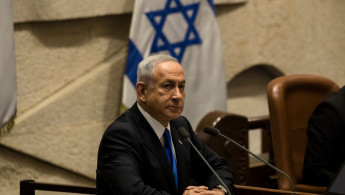Israel: Netanyahu's UAE visit delayed amid global outrage over Ben-Gvir's storming of Al-Aqsa
Israeli Prime Minister Benjamin Netanyahu will not visit the UAE next week following widespread condemnation over the storming of the Al-Aqsa Mosque compound by his new National Security Minister.
Extreme-right Israeli politician Itamar Ben-Gvir toured the periphery of the holy mosque's compound on Tuesday. The incursion was widely seen as a deliberate provocation to longstanding status-quo agreements which allow non-Muslims to visit the site at specific times but not pray there.
The UAE was among several Middle Eastern and Western states to "strongly condemn" Ben-Gvir's visit to Al-Aqsa, the third-holiest site in Islam and the most sacred Muslim place in Palestine.
Later on Tuesday, it emerged that Netanyahu’s slated trip to the country - set to be his first official trip after returning to power - had been postponed until February.
Sources close to the Israeli prime minister "denied any connection between the incidents," said The Times of Israel.
They claimed the visit had been postponed due to "logistical considerations," the Israeli news site said.
However, news of the delayed trip broke just as the UAE called on "Israeli authorities to assume responsibility for reducing escalation and instability in the region".
Israeli analysts also predicted that Ben-Gvir's visit to Al-Aqsa could ruin Netanyahu's plans to normalise relations with Saudi Arabia.
Writing for the Israeli Walla news website, Barak Ravid said that Saudi Arabia "had to" stand against Ben-Gvir's provocation because of its presumed role as the leader of Sunni Arab nations.
The UAE normalised relations with Israel in 2020 as part of the controversial Abraham Accords, brokered by Trump administration.
Palestinians slammed the deal as a betrayal of their cause, because it rewarded Israel while it continued to occupy the West Bank and besiege the Gaza Strip. Bahrain, Morocco, Sudan have also signed normalisation deals.
In the years leading up to the Abraham Accords, Netanyahu visited the UAE several times covertly. His January 2023 trip, confirmed on Monday and then postponed on Tuesday, was set to be a high-profile public visit to the Gulf state.
Jordan's foreign ministry spokesman Sinan Majali said Amman summoned the Israeli ambassador to "convey a protest message about the recklessness of the Israeli national security minister in storming the blessed Al-Aqsa Mosque" 👇https://t.co/eAShKirRtJ
— The New Arab (@The_NewArab) January 4, 2023
Instead, Abu Dhabi alongside China has urged the United Nations Security Council to convene a meeting to discuss Ben-Gvir’s storming of Al-Aqsa.
The meeting is likely to occur on Thursday.
Qatar, Saudi Arabia, Turkey, Jordan and the US have all condemned Israel for Ben-Gvir's provocations.
The extremist minister's actions have been compared to an incursion by former Israeli Prime Minister Ariel Sharon, whose visit to the holy site in 2000 sparked the Second Palestinian Intifada.
Jews refer to the compound as the Temple Mount and consider it a holy site, although many Jews believe praying there violates religious law.
Lying in the walled Old City of East Jerusalem, which Israel has illegally annexed, the compound is administered by the Waqf Islamic affairs council, with Israeli forces operating there and controlling access.
"Al-Aqsa is an important symbol of Palestinian nationhood and culture, and a hugely significant site for Muslims worldwide. It must be protected from Israeli occupation and apartheid," said campaign group Friends of Al-Aqsa in a statement sent to The New Arab.





 Follow the Middle East's top stories in English at The New Arab on Google News
Follow the Middle East's top stories in English at The New Arab on Google News


